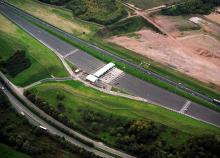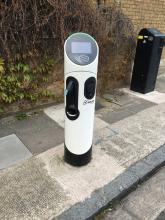The Institution of Mechanical Engineers is calling for a major Clean Air Act to counter what it believes is a deadly rise in air pollution along the countries' transportation corridors, both road and rail. “Individuals breathe in 20kg of air every day and because we can’t see it, we don’t know about the harmful particles it contains,” said Philippa Oldham, lead author of the report Breath of fresh air: new solutions to reduce transport emissions. “Even railway stations have relatively high levels of air pollution from diesel.”
Oldham noted that news media focus on London and its air pollution problems. But other cities are equally affected. In cities outside London the proportion of public transport is lower, so the proportion of emissions from diesel and petrol cars is greater. In Manchester, 43% of emissions come from cars and just 11% from buses.
The report call on the UK government to financially back development of cleaner technologies and phase out older vehicles with poor emissions, such as diesel cars and trains*. Freight and logistic operators should make deliveries outside peak commuting hours. Meanwhile, the government should fund research through the Clean Air Fund and Innovate UK to create programmes to clean up various transport modes.
A new Clean Air Act should set out ways to help the 71% of local authorities which missed their 2017 air quality targets. It must also address emissions from across all the UK’s transport modes. The UK must assess emerging technologies for carbon emissions throughout the technology’s entire life cycle, including the procurement of parts and fuel.
The report acknowledged that development of electric vehicles, which produce lower emissions, encounter challenges such as how to dispose of their battery cells at the end of their useful life. Nonetheless, people can make daily decisions about recycling and reducing their own contribution towards air pollution. “Technology has its part to play in addressing the problem, but there is a role and responsibility for individuals too,” she said.
*Since the release of the report, the UK government has said it will end diesel-only powered trains by 2040. Last year, the government moved to ban the sale of new non-hybrid petrol and diesel cars by 2040.
UK’s IMechE calls for a Clean Air Act
The UK needs extensive monitoring of current transport emissions in order to set realistic pollution reduction targets, according to an engineering umbrella organisation.
The Institution of Mechanical Engineers is calling for a major Clean Air Act to counter what it believes is a deadly rise in air pollution along the countries' transportation corridors, both road and rail. “Individuals breathe in 20kg of air every day and because we can’t see it, we don’t know about the harmful particles it contains,” sai
The UK needs extensive monitoring of current transport emissions in order to set realistic pollution reduction targets, according to an engineering umbrella organisation.








